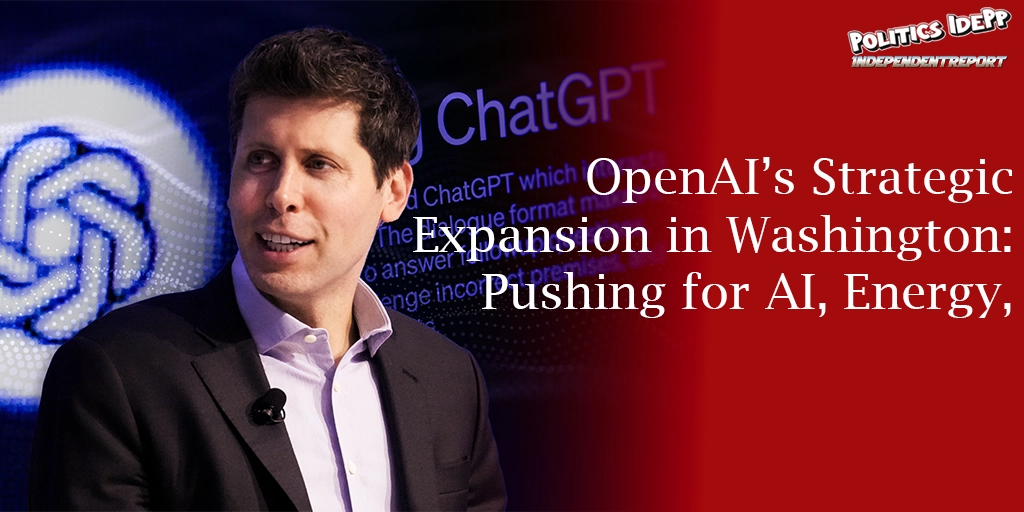
OpenAI’s Strategic Expansion in Washington: Pushing for AI, Energy, and National Security
IndependentReport – OpenAI’s strategic expansion, the creator of ChatGPT, is significantly increasing its presence in Washington, D.C. The company is expanding its policy team and promoting a bold new plan to improve energy infrastructure for AI data centers. OpenAI’s push signals its ambition to influence U.S. policy on AI, energy, and national security
A. Increasing Washington Presence
OpenAI has tripled its D.C. policy team, aiming to play a larger role in U.S. politics. The company seeks to influence policies on energy, national security, and AI development. While still small compared to giants like Amazon and Meta, OpenAI’s move shows it wants to increase its influence.
B. Key Policy Hires
OpenAI has recruited political experts from across the aisle. For instance, Matt Rimkunas and Meghan Dorn, former aides to Senator Lindsey Graham (R-S.C.), are part of the team. Sasha Baker, a former deputy undersecretary at the Department of Defense, will lead national security policy. These diverse hires help OpenAI engage with both Republicans and Democrats.
READ MORE : Mangga dan Vitamin C: Rahasia Kulit Sehat dan Cerah Alami
A. AI Economic Zones
OpenAI proposes creating “AI economic zones” to streamline data center construction. These zones would fast-track permits, making it easier to build the necessary infrastructure for AI technologies. OpenAI believes that these zones are critical to meeting the rising demand for data storage and computing power.
B. National Power Grid for Data Centers
The company is also pushing for a national electrical transmission grid to support these AI data centers. As demand for AI services grows, data centers need more energy. OpenAI’s proposal aims to provide a reliable power source for these facilities, ensuring they can operate at scale.
C. Industry-Wide Support
OpenAI’s strategic expansion push for better energy infrastructure is not unique to them. Many tech companies, called “hyperscalers,” share the need for these reforms. This broader industry support could help OpenAI achieve its goals and influence policymakers.
A. AI for National Security
National security is another area where OpenAI is focusing its efforts. The company has partnered with the Department of Defense’s Air Force Research Lab and defense tech firm Anduril. These collaborations aim to integrate AI into U.S. defense systems.
B. Positioning AI as a Strategic Asset
Lehane, a key policy figure at OpenAI, emphasizes that AI is essential for U.S. leadership in global tech and military power. “To stay ahead in AI, the U.S. must engage with companies like OpenAI,” he said. This message highlights the strategic importance of AI in geopolitics, especially in competition with China.
A. Changing Focus on AI Regulation
Previously, OpenAI’s CEO Sam Altman called for AI regulation to ensure safety and fairness. However, with regulatory efforts stalled, the focus is shifting toward encouraging AI innovation. This change has allowed OpenAI to advance its agenda without the constraints of strict regulations.
B. Strategic Military Partnerships
In response to this shift, OpenAI has formed several key partnerships. It is collaborating with the U.S. military and other defense contractors to supply AI technologies. These moves align with OpenAI’s strategic expansion focus on national security and its desire to shape the future of AI in defense.
A. Shaping AI’s Role in the U.S. Economy
OpenAI’s D.C. expansion is part of a broader strategy to shape the future of AI. By advocating for energy infrastructure and national security policies, OpenAI seeks to ensure the U.S. leads in AI development. The company’s actions indicate that it wants to be central to AI’s evolution in both the public and private sectors.
B. AI in Global Competition
As the global AI race intensifies, OpenAI’s strategic expansion is positioning itself as a key player. Its focus on national security and energy infrastructure puts it at the forefront of the debate on AI’s role in shaping future economic and military power.
OpenAI’s strategic expansion in Washington underscores its commitment to influencing U.S. policy on AI, energy, and national security. As the company continues to push for infrastructure reforms and defense collaborations, its role in shaping the future of AI technology will only grow. The coming years will likely see OpenAI become even more influential in U.S. policymaking.